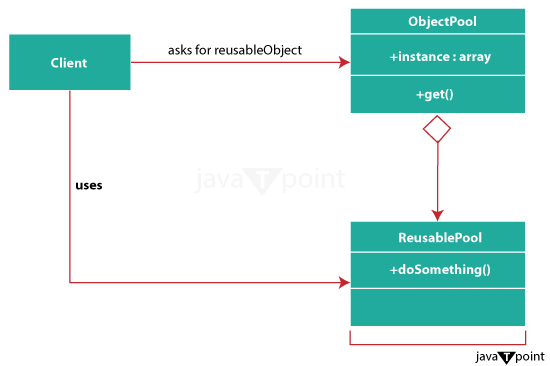Creating Multiple Pools of Objects of Variable Size in JavaThe object pool design pattern is a powerful tool for optimizing Java application performance and memory usage. It holds particular value when dealing with expensive-to-create objects or scenarios involving large numbers of objects. The Object Pool design pattern in Java operates on the principle of reusing objects, particularly in situations where the creation of objects is resource-intensive and could lead to memory challenges when numerous objects are instantiated. The pattern is especially beneficial for enhancing application performance. The underlying mechanism of the Object Pool design pattern revolves around object pooling. When multiple clients seek access to identical, stateless objects that are costly to create, the pattern employs a pool of reusable objects. Object Pool Lifecycle
How do you create Multiple pools of Objects?Creating multiple pools of objects involves defining a manager or a class responsible for managing each pool. Below are the general steps to create multiple pools of objects: 
Real-time requirementMemory allocation tailored for error handling or emergent scenarios in programming can be efficiently managed by creating multiple variable-size memory pools. Object pooling becomes crucial when certain objects, such as database connection objects, parser objects, or thread generation, appear to be relatively more expensive to produce due to their non-lightweight nature. Rather than incurring the overhead of creating new instances, these objects can be reused from a pool, mitigating the negative impact on program performance. By constructing multiple pools of objects, each accommodating the specific needs of resource-intensive entities, applications can Implementation:Filename: CustomThreadPool.java Output: POOL1 Of Threads Created Pool 1 initialized Acquired: 1 is the thread number of the pool 1 Acquired: 2 is the thread number of the pool 1 Thread 3 does not refer to any object Pool 1 not initialized as it was already initialized POOL2 Of Threads Created Acquired: 1 is the thread number of the pool 2 Benefits of Object Pooling
Next TopicDefault Exception in Java
|
 For Videos Join Our Youtube Channel: Join Now
For Videos Join Our Youtube Channel: Join Now
Feedback
- Send your Feedback to [email protected]
Help Others, Please Share









